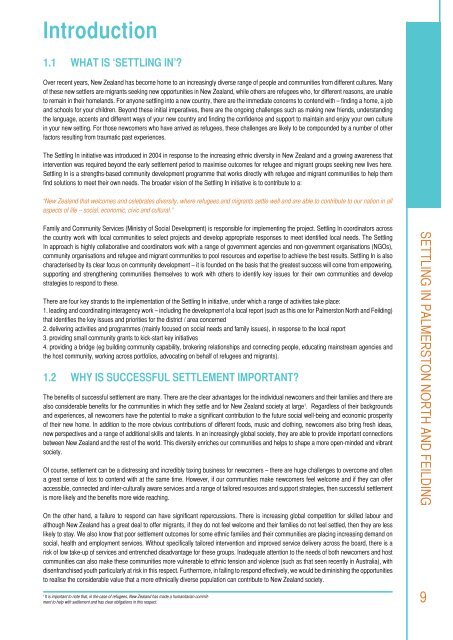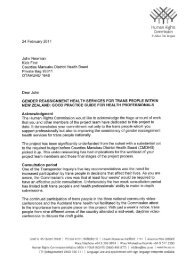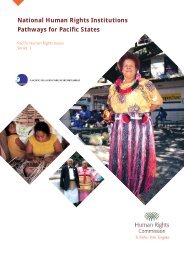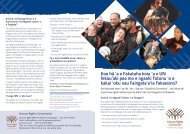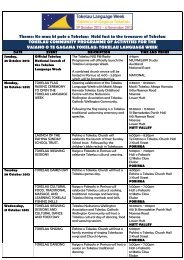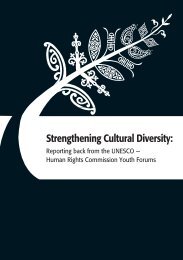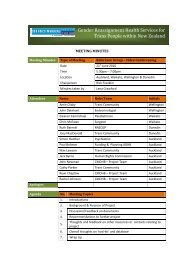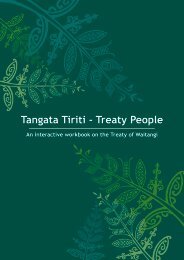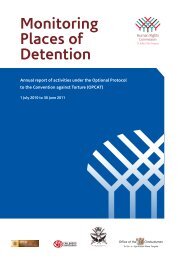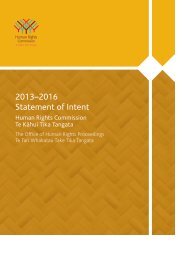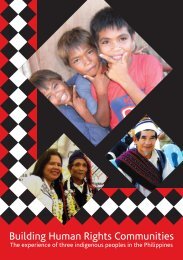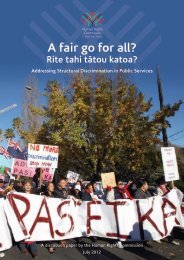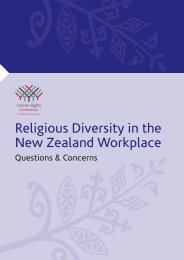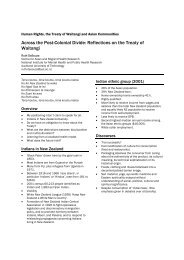Settling In Palmerston North and Feilding - Human Rights Commission
Settling In Palmerston North and Feilding - Human Rights Commission
Settling In Palmerston North and Feilding - Human Rights Commission
You also want an ePaper? Increase the reach of your titles
YUMPU automatically turns print PDFs into web optimized ePapers that Google loves.
<strong>In</strong>troduction1.1 What is ‘<strong>Settling</strong> <strong>In</strong>’?Over recent years, New Zeal<strong>and</strong> has become home to an increasingly diverse range of people <strong>and</strong> communities from different cultures. Manyof these new settlers are migrants seeking new opportunities in New Zeal<strong>and</strong>, while others are refugees who, for different reasons, are unableto remain in their homel<strong>and</strong>s. For anyone settling into a new country, there are the immediate concerns to contend with – finding a home, a job<strong>and</strong> schools for your children. Beyond these initial imperatives, there are the ongoing challenges such as making new friends, underst<strong>and</strong>ingthe language, accents <strong>and</strong> different ways of your new country <strong>and</strong> finding the confidence <strong>and</strong> support to maintain <strong>and</strong> enjoy your own culturein your new setting. For those newcomers who have arrived as refugees, these challenges are likely to be compounded by a number of otherfactors resulting from traumatic past experiences.The <strong>Settling</strong> <strong>In</strong> initiative was introduced in 2004 in response to the increasing ethnic diversity in New Zeal<strong>and</strong> <strong>and</strong> a growing awareness thatintervention was required beyond the early settlement period to maximise outcomes for refugee <strong>and</strong> migrant groups seeking new lives here.<strong>Settling</strong> <strong>In</strong> is a strengths-based community development programme that works directly with refugee <strong>and</strong> migrant communities to help themfind solutions to meet their own needs. The broader vision of the <strong>Settling</strong> <strong>In</strong> initiative is to contribute to a:“New Zeal<strong>and</strong> that welcomes <strong>and</strong> celebrates diversity, where refugees <strong>and</strong> migrants settle well <strong>and</strong> are able to contribute to our nation in allaspects of life – social, economic, civic <strong>and</strong> cultural.”Family <strong>and</strong> Community Services (Ministry of Social Development) is responsible for implementing the project. <strong>Settling</strong> <strong>In</strong> coordinators acrossthe country work with local communities to select projects <strong>and</strong> develop appropriate responses to meet identified local needs. The <strong>Settling</strong><strong>In</strong> approach is highly collaborative <strong>and</strong> coordinators work with a range of government agencies <strong>and</strong> non-government organisations (NGOs),community organisations <strong>and</strong> refugee <strong>and</strong> migrant communities to pool resources <strong>and</strong> expertise to achieve the best results. <strong>Settling</strong> <strong>In</strong> is alsocharacterised by its clear focus on community development – it is founded on the basis that the greatest success will come from empowering,supporting <strong>and</strong> strengthening communities themselves to work with others to identify key issues for their own communities <strong>and</strong> developstrategies to respond to these.There are four key str<strong>and</strong>s to the implementation of the <strong>Settling</strong> <strong>In</strong> initiative, under which a range of activities take place:1. leading <strong>and</strong> coordinating interagency work – including the development of a local report (such as this one for <strong>Palmerston</strong> <strong>North</strong> <strong>and</strong> <strong>Feilding</strong>)that identifies the key issues <strong>and</strong> priorities for the district / area concerned2. delivering activities <strong>and</strong> programmes (mainly focused on social needs <strong>and</strong> family issues), in response to the local report3. providing small community grants to kick-start key initiatives4. providing a bridge (eg building community capability, brokering relationships <strong>and</strong> connecting people, educating mainstream agencies <strong>and</strong>the host community, working across portfolios, advocating on behalf of refugees <strong>and</strong> migrants).1.2 Why is Successful Settlement Important?The benefits of successful settlement are many. There are the clear advantages for the individual newcomers <strong>and</strong> their families <strong>and</strong> there arealso considerable benefits for the communities in which they settle <strong>and</strong> for New Zeal<strong>and</strong> society at large 1 . Regardless of their backgrounds<strong>and</strong> experiences, all newcomers have the potential to make a significant contribution to the future social well-being <strong>and</strong> economic prosperityof their new home. <strong>In</strong> addition to the more obvious contributions of different foods, music <strong>and</strong> clothing, newcomers also bring fresh ideas,new perspectives <strong>and</strong> a range of additional skills <strong>and</strong> talents. <strong>In</strong> an increasingly global society, they are able to provide important connectionsbetween New Zeal<strong>and</strong> <strong>and</strong> the rest of the world. This diversity enriches our communities <strong>and</strong> helps to shape a more open-minded <strong>and</strong> vibrantsociety.Of course, settlement can be a distressing <strong>and</strong> incredibly taxing business for newcomers – there are huge challenges to overcome <strong>and</strong> oftena great sense of loss to contend with at the same time. However, if our communities make newcomers feel welcome <strong>and</strong> if they can offeraccessible, connected <strong>and</strong> inter-culturally aware services <strong>and</strong> a range of tailored resources <strong>and</strong> support strategies, then successful settlementis more likely <strong>and</strong> the benefits more wide reaching.SETTLING IN PALMERSTON NORTH AND FEILDINGOn the other h<strong>and</strong>, a failure to respond can have significant repercussions. There is increasing global competition for skilled labour <strong>and</strong>although New Zeal<strong>and</strong> has a great deal to offer migrants, if they do not feel welcome <strong>and</strong> their families do not feel settled, then they are lesslikely to stay. We also know that poor settlement outcomes for some ethnic families <strong>and</strong> their communities are placing increasing dem<strong>and</strong> onsocial, health <strong>and</strong> employment services. Without specifically tailored intervention <strong>and</strong> improved service delivery across the board, there is arisk of low take-up of services <strong>and</strong> entrenched disadvantage for these groups. <strong>In</strong>adequate attention to the needs of both newcomers <strong>and</strong> hostcommunities can also make these communities more vulnerable to ethnic tension <strong>and</strong> violence (such as that seen recently in Australia), withdisenfranchised youth particularly at risk in this respect. Furthermore, in failing to respond effectively, we would be diminishing the opportunitiesto realise the considerable value that a more ethnically diverse population can contribute to New Zeal<strong>and</strong> society.1It is important to note that, in the case of refugees, New Zeal<strong>and</strong> has made a humanitarian commitmentto help with settlement <strong>and</strong> has clear obligations in this respect.9


